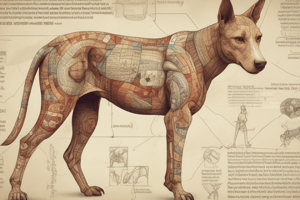Podcast
Questions and Answers
A veterinarian is describing a lesion located on a dog's front paw, furthest from the body. Which directional term is most appropriate to use?
A veterinarian is describing a lesion located on a dog's front paw, furthest from the body. Which directional term is most appropriate to use?
- Proximal
- Distal (correct)
- Ventral
- Cranial
A researcher is studying the brain of a rat and needs to make a cut that separates the brain into dorsal and ventral portions. Which plane of section should the researcher use?
A researcher is studying the brain of a rat and needs to make a cut that separates the brain into dorsal and ventral portions. Which plane of section should the researcher use?
- Sagittal
- Median
- Frontal (correct)
- Transverse
During surgery, a surgeon needs to access an organ located towards the tail of a dog. Which directional term should the surgeon use to describe the location of the organ?
During surgery, a surgeon needs to access an organ located towards the tail of a dog. Which directional term should the surgeon use to describe the location of the organ?
- Cranial
- Rostral
- Anterior
- Caudal (correct)
A veterinarian prescribes a medication to be administered 'BID PO'. What does this instruction mean?
A veterinarian prescribes a medication to be administered 'BID PO'. What does this instruction mean?
A veterinary technician notes a superficial scratch on the dorsal aspect of a cat. Which of the following best describes the location of the scratch?
A veterinary technician notes a superficial scratch on the dorsal aspect of a cat. Which of the following best describes the location of the scratch?
Which abbreviation would a veterinarian use to indicate they want to administer a vaccine under the skin?
Which abbreviation would a veterinarian use to indicate they want to administer a vaccine under the skin?
If a veterinarian is examining the area around a dog's nose, which directional term would be most appropriate to use?
If a veterinarian is examining the area around a dog's nose, which directional term would be most appropriate to use?
What vital signs are typically recorded when a vet tech assesses a 'TPR'?
What vital signs are typically recorded when a vet tech assesses a 'TPR'?
A dog needs an antibiotic for an infection, and the prescription reads 'Amoxicillin 250mg TID'. How many times a day should the dog receive the medication?
A dog needs an antibiotic for an infection, and the prescription reads 'Amoxicillin 250mg TID'. How many times a day should the dog receive the medication?
A chart lists 'QOL' as a consideration for an elderly animal. What does 'QOL' refer to in this context?
A chart lists 'QOL' as a consideration for an elderly animal. What does 'QOL' refer to in this context?
A researcher is studying the spread of a novel disease among sheep populations. Which term accurately describes the population under study?
A researcher is studying the spread of a novel disease among sheep populations. Which term accurately describes the population under study?
A veterinary practice wants to emphasize its commitment to high standards of care and is seeking accreditation. Which organization should they primarily consult?
A veterinary practice wants to emphasize its commitment to high standards of care and is seeking accreditation. Which organization should they primarily consult?
A wildlife biologist is conducting research on different species found in a local ecosystem. Which area of study focuses specifically on amphibians and reptiles?
A wildlife biologist is conducting research on different species found in a local ecosystem. Which area of study focuses specifically on amphibians and reptiles?
A student is fascinated by the diverse world of fishes. Which field of zoology would be most relevant to their interests?
A student is fascinated by the diverse world of fishes. Which field of zoology would be most relevant to their interests?
A researcher is investigating the anatomical features of cats to understand their evolutionary adaptations. Which term applies to the animal group under study?
A researcher is investigating the anatomical features of cats to understand their evolutionary adaptations. Which term applies to the animal group under study?
Which scenario is most indicative of ethical euthanasia practices?
Which scenario is most indicative of ethical euthanasia practices?
What is the primary ethical consideration differentiating euthanasia from unethical killing?
What is the primary ethical consideration differentiating euthanasia from unethical killing?
A dog owner is looking for a breed that is both intelligent and good with children. Based on the provided breed information, which breed would be the better choice?
A dog owner is looking for a breed that is both intelligent and good with children. Based on the provided breed information, which breed would be the better choice?
Which of the following scenarios would be considered unethical regarding animal euthanasia?
Which of the following scenarios would be considered unethical regarding animal euthanasia?
A potential dog owner wants a dog that is highly trainable and has a lot of energy. Which of the following would be the best choice?
A potential dog owner wants a dog that is highly trainable and has a lot of energy. Which of the following would be the best choice?
Flashcards
Anterior
Anterior
Towards the front of the animal.
Rostral
Rostral
Towards the nose.
Posterior
Posterior
Towards the rear end.
Cranial
Cranial
Signup and view all the flashcards
Frontal Plane
Frontal Plane
Signup and view all the flashcards
Canine
Canine
Signup and view all the flashcards
Feline
Feline
Signup and view all the flashcards
Equine
Equine
Signup and view all the flashcards
Zoology
Zoology
Signup and view all the flashcards
Pathology
Pathology
Signup and view all the flashcards
IM
IM
Signup and view all the flashcards
IV
IV
Signup and view all the flashcards
PO
PO
Signup and view all the flashcards
TPR
TPR
Signup and view all the flashcards
SubQ/SC
SubQ/SC
Signup and view all the flashcards
Euthanasia
Euthanasia
Signup and view all the flashcards
Euthanasia Decision Factors
Euthanasia Decision Factors
Signup and view all the flashcards
Unethical Killing
Unethical Killing
Signup and view all the flashcards
German Shorthaired Pinscher
German Shorthaired Pinscher
Signup and view all the flashcards
German Shepherd Characteristics
German Shepherd Characteristics
Signup and view all the flashcards
Study Notes
Unit 6 Study
- It's important to understand euthanasia, quality of life, and the factors influencing the decision to euthanize an animal, understanding the difference between humane euthanasia and unethical killing.
- Study and know dog breeds and their characteristics,
- Memorize directional, zoological, and veterinary vocabulary.
Euthanasia
- Defined as a humane act of ending an animal's life to prevent suffering, painlessly, and stress-free.
- The decision making should consider the animal's quality of life, pain, and illness.
- Ethical euthanasia strict guidelines lines must be followed to ensure a peaceful passing, so unethical killing, which causes unnecessary pain and welfare concerns, is avoided.
- Quality of life, disease and veterinarians are considerations
- Follow AVMA guidelines
- Unethical killing occurs due to convenience or neglect, is often painful, involves untrained individuals and violates ethical standards.
Dog Breed Characteristics
- German Shepards are known for being intelligent, trainable, loyal, energetic and protective
- German Shorthaired Pointers are athletic, agile, intelligent, eager, friendly, and affectionate.
Zoological & Veterinary terms
- Canine: Dog
- Feline: Cat
- Equine: Horse
- Bovine: Cattle
- Porcine: Pig
- Avian: of birds
- Caprine: Goats
- Cavia: Guinea Pigs
- Leporine: Rabbit
- Murine: Mouse or Rat
- Ovine: Sheep
- Piscine: Fish
- laniger: Chinchilla
Ology Definitions
- Biology: the study of life
- Herpetology: the study of reptiles and amphibians
- Ichthyology: the study of fish
- Ornithology: the study of birds
- Pathology: the study of illness
- Primatology: the study of primates
- Zoology: the study of animals
Vet Abbreviation terms
AAHA: American Animal Hospital Association
- LVT: Licensed veterinary technicians
- DVM: Doctor of veterinary medicine
- DVT: Doctor of veterinary technician
- NAVTA: National Association of Veterinary Technician in America
- VMD: Veterinary medical doctor.
Veterinary Abbreviation terms
-
a.d.lib: as much as desired
-
DOB: date of birth
-
IM: Intramuscular
-
IV: Intravenous
-
ml: milliliter, cubic centimeters
-
PO: orally
-
QOL: quality of life
-
Subq, SC: subcutaneous
-
W/o: without
-
TPR: temperature, pulse, respiration
-
Wt: weight
-
W/: with
-
1 SID: Once per day
-
2 BID: Twice per day
-
3 TID: Three times per day
-
4 QID: Four times per day
Directional Terminology
- Anterior: the front of the animal
- Rostral: in the front of the face, closest to the nose
- Posterior: the rear end of the animal.
- Cranial: towards the head.
- Caudal: towards the tail.
- Dorsal: along the back, uppermost surface.
- Ventral: along the belly, under the most surface.
- Proximal: part of the limb, closest to the body.
- Distal: part of the limb farthest away from the body.
- Plantar: related to the sole of the foot.
- Palmar: related to the palm of the hand.
- Volar: related to both the sole and palm.
- Median: if it is a four legged animal, imagine looking at them straight on. Then splitting them right down the middle (hotdog)
- Transverse: splits in half sideways facing (hamburger)
- Frontal
- Saggital
- Deep: (Deep Cuts) meaning surface minor, (Little scratch)
- Superficial: (Surface Minor)
Studying That Suits You
Use AI to generate personalized quizzes and flashcards to suit your learning preferences.




